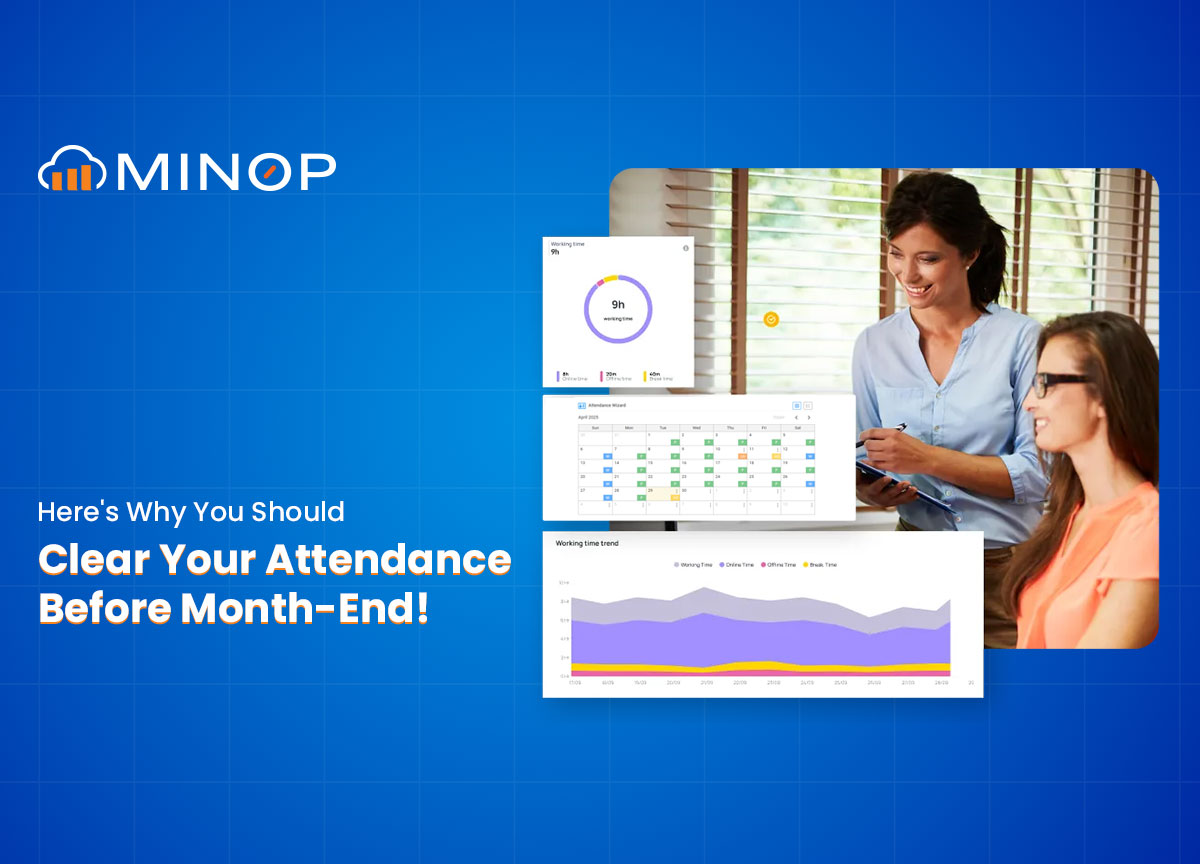Struggling with Month-End Attendance Mess? Here's Why.
Posted On:- 08 April, 2025 By:- Vaibhav Maniyar
Just reading those two words might make your heart skip a beat if you’re the kind of employee who’s always scrambling on the last working day of the month.
It’s that familiar feeling of opening the attendance management app and seeing a maze of missed punches, late logins, unexplained absences, or worse, an entire week you forgot to log because you were “too busy.” And you’re not alone. In fact, Over 45% of workers feel anxious when they’re unsure how attendance policies work, especially when time off or missed punches could affect pay.
For most companies using digital time tracking systems, end-of-month reconciliation has become a ritual which is stressful, rushed, and filled with reminders like “Clear your attendance before payroll closes!”
But what if clearing attendance wasn’t a frantic exercise at the 11th hour? What if you never had to clear it at all?
Why is Attendance Still an Afterthought?
Maybe it’s your first month at the job, and you’re still learning the system. Maybe you rely on your manager to remind you. Or maybe the app isn’t exactly user-friendly.
But often, it’s none of that.
It's a habit. Or rather, the lack of one.
Many employees underestimate the role attendance management plays which is not just in getting paid on time, but in shaping your professionalism and reliability. When attendance gets ignored, payroll errors follow, performance metrics blur, and HR ends up chasing down corrections for hours.
It’s not that you meant to slack but it’s just that clearing attendance wasn’t on your radar until the warning emails hit.
Signs You’re an End-of-Month Attendance Sprinter
How do you know if you’ve fallen into the “last-minute clearance” club? Let’s do a quick check:
You only open the attendance management app when HR sends a reminder.
You guess your login/logout times based on memory (and hope for the best).
You regularly send “Please adjust my shift” emails after payroll closes.
You ask coworkers what they’re logging so you can match it.
You’ve never used the self-service portal unless something’s wrong.
If you nodded at more than two of these, it’s time for a change.
What’s the Cost of Poor Attendance Management?
Forgetting to mark your attendance won’t get you fired but it does create friction. For HR, for your team, and for you.
That missing punch might not seem like a big deal until you realize it’s docked your pay. Or until your leave balance is wrong. Or when your appraisal score takes a dip for “irregular attendance.”
Beyond that, it eats away at your credibility. You don’t want to be the employee who’s always catching up, always explaining, always fixing something after it should’ve been done.
Related: How to Choose the Right Student Attendance App
Five Ways End-of-Month Attendance Chaos Affects You
Let’s break it down. Here’s what delayed or messy attendance really does:

Delays Your Salary:
One missed punch might throw off your working days. That means your pay isn’t processed-or worse, processed incorrectly.

Frustrates Your Manager:
Supervisors spend valuable time approving backdated requests and double-checking records. This takes away from actual team planning.

Causes Leave Miscalculations:
Unclear attendance management records often miscount casual leaves, comp-offs, and unpaid time—leading to inaccurate leave balances.

Hurts Your Professional Image:
Consistently forgetting to clear attendance might send the wrong message: that you’re careless or disengaged.

Wastes Your Time:
Every month you’re back at it—digging through emails, screenshots, calendars—trying to piece together your own timeline. It’s exhausting.
Okay, So How Do You Actually Stay On Top of It?
There’s no secret magic. Just simple practices that make all the difference.

Check Weekly, Not Monthly:
Make Friday your personal attendance check-in. Five minutes. That’s all.

Use Notifications:
If your app has reminders, turn them on. If not, set a calendar nudge.

Own Your Dashboard:
Know how the system works. Learn where to view, where to edit, and where to raise a request.

Clear on the 25th, Not the 31st:
Build in buffer days. HR and payroll teams will love you for it.

Talk to Your Manager:
If you’re unsure how to regularize something, ask early—not when payroll’s already closed.
Clearing attendance is showing up for your role, your team, and your pay.
It reflects how you manage your time, respect systems, and take ownership of small but important responsibilities.
And the truth is, once you build the habit, it stops feeling like a chore.
Let This Be the Last Time You Panic at Month-End
You don’t need to spend the last day of the month scrambling through your calendar and hoping HR will approve your backdated punch.
With Minop, all the request leave, attendance clearance and other requests goes directly to your superior which approves it all at once (depending on your performance) and a dashboard shows the live updates of this happening without the clock moving a minute ahead!
With a little consistency, a few reminders, and a willingness to be proactive, clearing your attendance management can go from being a crisis to being a non-event. Most of all, you can achieve this feat without any effort whatsoever needed.
Frequently Asked Questions
1. Why do I forget to clear attendance every month?
It usually happens because attendance isn’t part of your weekly routine. Without regular check-ins or reminders, you leave it till payroll time—creating stress, missed entries, and urgent last-minute fixes.
2. Can poor attendance affect my salary?
Yes, missing or incorrect punches can delay salary processing and cause miscalculations in working days or leaves. It also impacts your performance scores and creates extra work for HR.
3. How can I avoid last-minute attendance issues?
Check your attendance weekly, not monthly. Turn on app reminders, learn your dashboard features, and clear everything by the 25th. These habits reduce pressure and prevent payroll headaches.
4. What makes Minop better for attendance tracking?
It usually happens because attendance isn’t part of your weekly routine. Without regular check-ins or reminders, you leave it till payroll time—creating stress, missed entries, and urgent last-minute fixes.

Comments